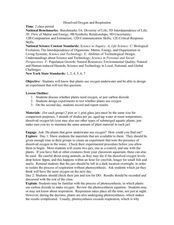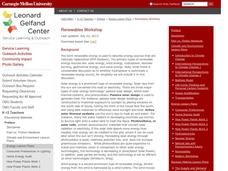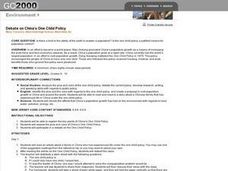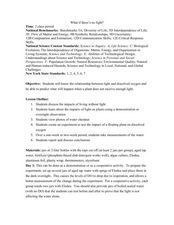Curated OER
Dissolved Oxygen and Respiration
Students are presented with the question, "Do plants that grow underwater use oxygen?" They create an experiment to test the presence of dissolved oxygen in the water using provided materials. Student experiments include a control jar as...
Curated OER
Digital Video Lesson Plan: Brine Shrimp
Learners participate in classroom experiment to gain better understanding of type of environment brine shrimp can best survive. Students then explore effects of common saltwater pollutants on survival of animals in sea.
Carnegie Mellon University
Renewables Workshop
Youngsters examine resource maps to find out which states are using solar and wind power and discuss as a class various other renewable energy sources. They use a provided data table to record pros and cons to each technology, build and...
Curated OER
You are the Microbiologist
In this lesson plan, students demonstrate comprehension of basic lab techniques by properly using these techniques in preparing a laboratory investigation, demonstrate synthesis of prior lab experiences by solving a new problem using...
Curated OER
Particulate Matter: The Lorax
Students collect air samples to test it for air pollution. They are read the story The Lorax and discuss the effects of air pollution. They share their observations with the class.
Curated OER
What's Hiding in the Air?
Fifth graders conduct experiments to study the effects of invisible air pollutants including one with a bean plant. They examine methods of invisible air pollutants.
Curated OER
This Stuff Makes Me Sick
Students participate in a lab showing the effects of pesticides on Lumbriculus variegatus. Several extensions and variations are also included in this lesson including one which relates the experiment to how pesticides enter our drinking...
Curated OER
Stream Chemistry Monitoring
Students become familiar with real-world gathering of chemical data. The experience how the science is done: the nature of analysis, data collection, interpretation, and presentation. They study a nearby body of water for their experiment.
Curated OER
Plants and Air Purity
Learners explore how green plants help improve air quality. They read an article and discuss the importance of air quality and its effects on the human body. They investigate by connecting hose to the top of a Bell jar and to a funnel....
Curated OER
The Effect of Medications on Daphnia
High schoolers explore how human beings affect the world's ecosystem by examining the affects of medication on daphnia, a small freshwater organism very sensitive to pollution. Students use a computer model to repeat the experiment and...
Curated OER
CO Buildup City
Students conduct a controlled experiment. They collect data in an organized manner. Students analyze data to reach a conclusion and communicate findings. They explain how city size, temperature, and pollution is related to the air quality.
Curated OER
Not a Drop to Drink
Students explore potential issues of a water shortage. In this water conservation lesson, students brainstorm the many uses of water and what life would be like if there was not enough water available.
Curated OER
Bean and Ozone Project
Students performed an experiment in which they grew beans in an ozone chamber and some in regular air in order to see if the ozone causes damage to the plants.
Curated OER
Groundwater Realities
Students review the components of the scientific inquiry method. In groups, they use the internet to research the sustainability of water resources in their community. They examine an environmental impact study, answer questions and...
Curated OER
Seed Germination
Young scholars explore plants and the scientific method. In this plant growth lesson plan, students follow the steps in the scientific method to perform a seed germination experiment as a whole class. Young scholars work in a group to...
Curated OER
Waterwheel Work
Young scholars investigate the history of the waterwheel and common uses for water turbines today. They construct an experimental waterwheel using a two-liter plastic bottle, measure the rate of revolution of a waterwheel, and complete...
Curated OER
Debate on China's One Child Policy
High schoolers learn about China's One Child Policy. They read an article about a specific family's experience under the policy (not included) and research and explain the key points of the policy. They assess the pros and cons in a...
Curated OER
Eye On Conservation Drainage Basin
Middle schoolers are able to describe the importance of wetland vegetation. They describe the impacts human activities have on water systems. Students compare and contrast the effect of different soil types on water filtration.
Curated OER
What If There's No Light?
students discuss the importance of light and the consequences of living without it. Using a plant as a demonstration, students predict and observe what happens to a plant when it does not receive enough light. In groups, they experiment...
Kenan Fellows
Determining Stream Health by the Diversity and Types of Benthic Organisms
How diverse are the benthic organisms found in local streams? Using the information learned in previous lessons on identification of macroinvertebrates and on calculating stream index values, groups determine the health of local streams....
Curated OER
The Great Pond Safari
Students study pond life by visiting a pond and completing an associated worksheet. They play an online game based on the pond learning experience.
Teach Engineering
Biological Processes: Putting Microbes to Work
Is there such a thing as useful microbes? Get ready to perform experiments on applying microbes for wastewater treatment. The first installment of the three-part unit provides background information to prepare young engineers for two...
Curated OER
Storm Drain Dumping
Students develop an awareness of what happens to water contaminated through neighborhood runoffs. Students perform an experiment that shows what happens to runoff when it's diverted to different places.
Curated OER
Pea Soup Ponds
Young scholars perform an experiment where they learn how water can be polluted by algal bloom. They grow algae with different concentrations of fertilizers or nutrients and analyze their results.

























